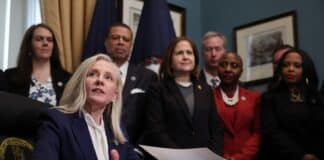Twenty-one state officials sent a letter to BlackRock CEO Larry Fink and other financial entities, condemning their efforts in “political advocacy” over “traditional fiduciary duty.”
The officials criticized BlackRock’s and other groups’ position as “stewards of trillions in passive investments” to advance “social and political agendas that fall outside the scope of materiality and positive financial return.”
In order to conduct business with the various states, officials demanded that BlackRock reaffirm that it has abandoned “the practice of framing deterministic future outcomes as long-term risks to justify immediate ideological interventions,” such as climate change alarmism. Officials further demanded that the financial entity commit to using “passive investment vehicles” for appropriate means rather than “actively influence company behavior.”
“Fiduciary duty has long been a critical safeguard that facilitated efficient capital allocation grounded in financial merit rather than political ideology,” the officials noted, going on to urge BlackRock to “provide clarity and demonstrate” its commitment to a “fiduciary model grounded in financial integrity, not political advocacy.”
The letter was signed by officials in Alabama, Alaska, Arizona, Idaho, Indiana, Iowa, Kansas, Kentucky, Louisiana, Mississippi, Missouri, Nebraska, North Carolina, North Dakota, Oklahoma, Pennsylvania, South Carolina, South Dakota, Utah, West Virginia, and Wyoming.
BlackRock, as well as other investment managers, have received federal scrutiny for their involvement in political agendas. Earlier this year, the Department of Justice filed a Statement of Interest in a lawsuit accusing asset managers BlackRock, State Street, and Vanguard of attempting to manipulate the energy market. According to a statement from the Federal Trade Commission, the lawsuit alleges that the asset managers “engaged in an anticompetitive conspiracy to drive down coal production as part of an industry-wide ‘Net Zero’ initiative to further anti-coal Environmental, Social, and Governance (ESG) goals.”





